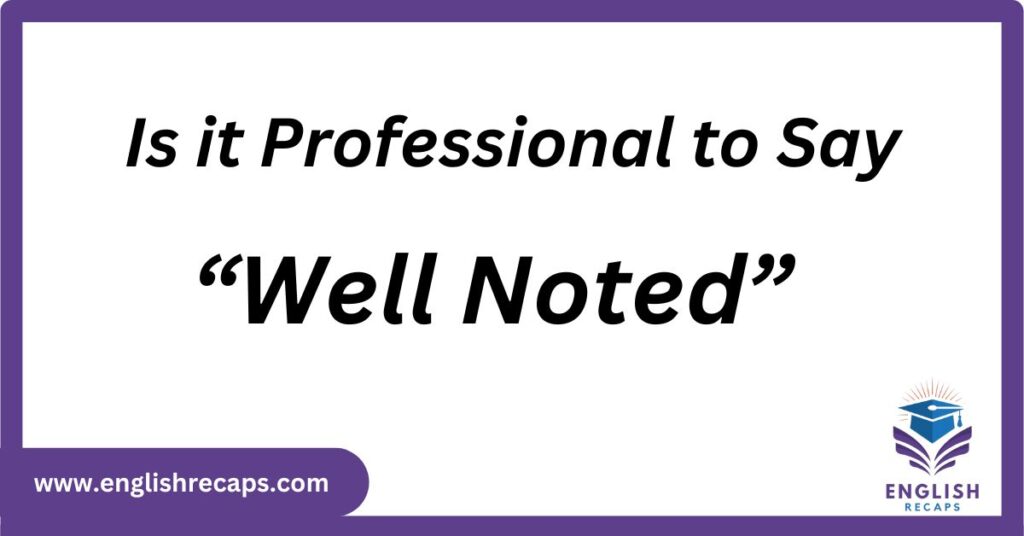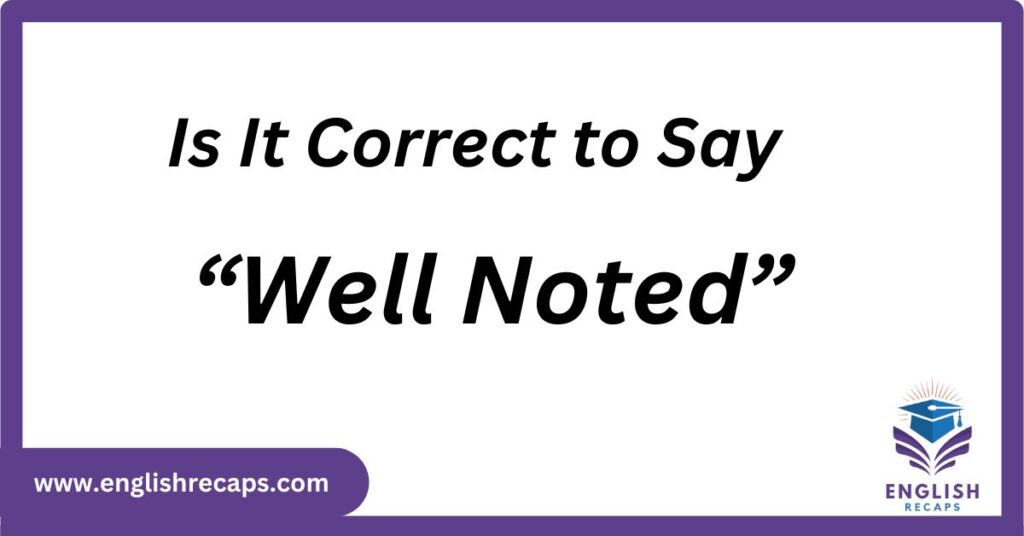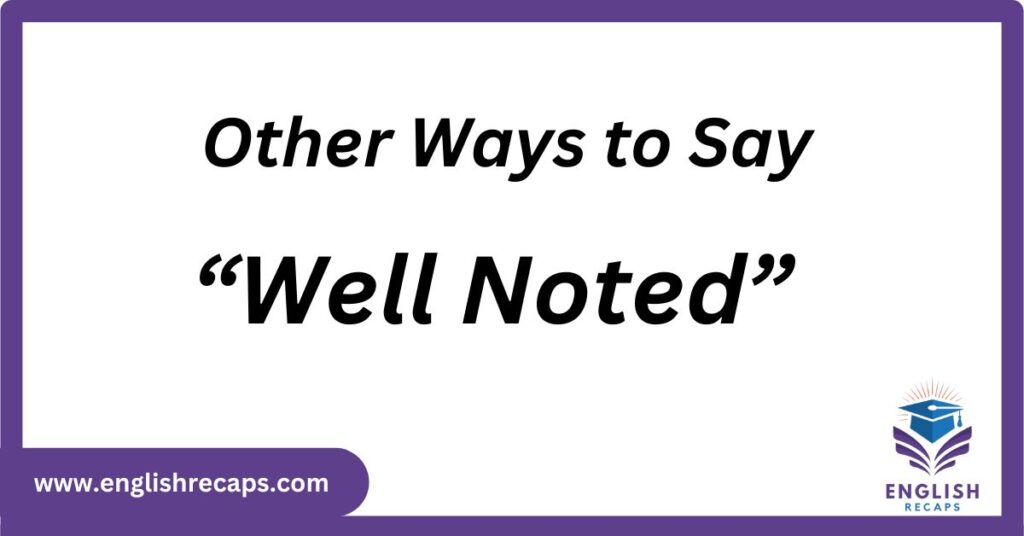In today’s fast-paced world of email communication, finding the right words to acknowledge a message can significantly impact professional interactions. The phrase “well noted” often serves as a quick acknowledgment, but overuse can render it stale and unengaging.
By opting for a variety of alternative expressions, you enhance the quality of your messages, fostering clearer dialogue and more meaningful connections. This not only demonstrates your attention to detail but also helps maintain a professional tone in all your communications.
Choosing a varied language allows you to convey appreciation, confirm understanding, and keep your responses lively. Using different phrases can help you stand out in a crowded inbox and ensure your business engagements feel fresh and dynamic.
From simple acknowledgments like “Thank you for the update” to more assertive phrases such as “Consider it done,” diversifying your responses enriches your email exchanges and promotes a more engaging conversation. In this article, we will explore ten effective alternatives to “well noted” that can elevate your digital messaging in any workplace communication scenario.
Is it Professional to Say “Well Noted”?

While saying “well noted” is professional, it can sometimes come across as impersonal or overused in “email communication”. It effectively acknowledges receipt or understanding of information, but it lacks the warmth or engagement that alternative phrases offer.
To “diversify your email language” and keep interactions fresh, using more varied expressions like “Thank you for the update” or “I’ve noted the information” can help maintain a “professional tone” while sounding more approachable.
Pros:
- Professional and concise: It quickly acknowledges receipt of information in a formal manner.
- Widely understood: The phrase is common in professional interactions, so recipients know exactly what you mean.
- Neutral tone: It’s safe and non-controversial, fitting for formal or routine communication.
Cons:
- Impersonal: It can feel cold or distant, especially in email exchanges that benefit from more personalized responses.
- Overused: Frequent use may make your communication sound repetitive or robotic, reducing engagement.
- Lacks clarity: It doesn’t always specify whether you fully understand or intend to act on the information provided.
Is It Correct to Say “Well Noted”?

Yes, it is correct to say “well noted,” and it’s commonly used in email communication to acknowledge that you’ve received and understood a message or piece of information. However, while it is acceptable in many contexts, its frequent use can come off as somewhat formal or impersonal.
In more casual or dynamic professional interactions, you might consider using alternative phrases to keep your communication engaging and varied. This approach not only enhances the tone of your emails but also fosters a more personable connection with your recipients. Balancing formality with warmth is key, especially in environments where engagement is valued.
What To Say Instead of “Well Noted” in an Email
- Thank you for the update.
- I’ve noted the information.
- I acknowledge receipt of your email.
- Got it, thank you!
- I’ve received your message.
- Your message has been received and understood.
- I’ll take this into consideration.
- I’m on it.
- Consider it done.
- Understood, I’ll proceed accordingly.
- I appreciate the information.
- Message received and I’ll get right on it.
- Your message has been taken into account.
- I’ve filed this for future reference.
- I’ll make sure to follow up on this.
- I’ve reviewed the information and will proceed accordingly.
- I will address this matter as soon as possible.
- Your input is valued and noted.
- I’ll take it from here.
- I acknowledge your request and will follow up shortly.
- This has been noted for future actions.
You may wish to learn another related post: 20 Other Ways to Say “I Believe in You” in an Email
1. “Thank you for the update.”
A simple yet effective way to show appreciation for the information you’ve received is by saying, “Thank you for the update.” This phrase is not only polite but also acknowledges that you’ve understood the content shared in the message.
Example: “Dear Rachel,
Thank you for the update on the project timeline. I’ll adjust my schedule accordingly to ensure we meet the deadline.
Best regards,
John”
This response works particularly well in corporate exchanges or when receiving new information during business engagements. It helps acknowledge receipt while also showing appreciation for the update.
2. “I’ve noted the information.”
This is a direct yet polite substitute for “well noted.” It confirms that you’ve read and understood the message, making it a good fit for workplace communications.
Example: “Hi Marcus,
I’ve noted the information regarding next week’s meeting. I’ll be prepared to discuss the new proposals.
Best,
Sarah”
The phrase is a good option for electronic mail interactions when you want to acknowledge receipt without being overly formal.
3. “I acknowledge receipt of your email.”
In formal meetings or more traditional career networking scenarios, using this alternative helps you maintain a polished demeanor and shows that you take the communication seriously.
Example: “Dear Ms. Johnson,
I acknowledge receipt of your email regarding the updated contract terms. I’ll review them thoroughly and get back to you by Friday.
Kind regards,
James”
This alternative expression is a great way to retain a formal tone while ensuring the sender knows you’ve received and understood the message.
4. “Got it, thank you!”
For more casual online correspondence, particularly with colleagues or teammates, you can use a friendly, concise acknowledgment like “Got it, thank you!” This maintains the engagement without sounding too stiff.
Example: “Hi Kelly,
Got it, thank you! I’ll start working on the report right away.
Cheers,
David”
This response works well in digital messaging where a less formal tone is appropriate but you still want to confirm reception.
5. “I’ve received your message.”
This phrase is perfect for scenarios where it’s important to confirm receipt of an email without diving into too much detail. It is neutral and fits well in most email exchanges.
Example: “Dear Jonathan,
I’ve received your message and will review the attached documents by tomorrow afternoon.
Sincerely,
Amy”
This phrase is particularly useful in business engagements where you want to recognize delivery of important documents or information.
6. “Your message has been received and understood.”
If you want to emphasize both receipt and comprehension, this phrase is a strong choice. It’s ideal for situations where clear communication is key, such as when discussing tasks in corporate exchanges.
Example: “Hi Alex,
Your message has been received and understood. I’ll proceed with the requested changes to the presentation.
Regards,
Chris”
This response helps ensure that not only did you acknowledge receipt, but you also confirm comprehension of the message.
7. “I’ll take this into consideration.”
When you want to express that you’ve noted someone’s input and will factor it into your decisions or actions, this phrase is a polite way to communicate your acknowledged understanding.
Example: “Dear Elizabeth,
Thank you for your feedback on the design proposal. I’ll take this into consideration as I revise the layout.
Best,
Tom”
In email communication, this phrase signals that you value the information shared, making it a thoughtful alternative expression for professional interactions.
8. “I’m on it.”
For more action-oriented workplace communications, especially when you want to show that you’re already moving forward with the task, “I’m on it” is a direct and energetic alternative.
Example: “Hi Lisa,
I’m on it! Expect the completed draft by the end of the day.
Best,
Steve”
This informal yet proactive phrase helps maintain fresh communication and keeps the interaction dynamic in internet communication settings.
9. “Consider it done.”
This phrase is a strong statement of action, useful when you want to convey that you’ll handle a request immediately. It’s perfect for online correspondence where quick responses are necessary.
Example: “Dear Michael,
Consider it done. I’ll forward the signed contract by this afternoon.
Best regards,
Emma”
“Consider it done” is a great phrase for those moments when you want to uphold professionalism while showing efficiency and enthusiasm in electronic mail interactions.
10. “Understood, I’ll proceed accordingly.”
This phrase combines acknowledgment and a commitment to follow through. It’s an excellent option when responding to specific instructions or directives.
Example: “Hi George,
Understood, I’ll proceed accordingly with the changes to the budget plan.
Thanks,
Lily”
This phrase is useful in business engagements when you want to validate understanding and demonstrate that you’re taking action based on the communication.
11. “I appreciate the information.”
This is a great phrase to use when you want to acknowledge someone’s email while also expressing gratitude. It adds a touch of warmth to your response, making the exchange more personal.
Example: “Hi Alex,
I appreciate the information you provided about the upcoming conference. I’ll ensure to register by the deadline.
Best regards,
Claire”
This response acknowledges the receipt of the message and expresses appreciation, which can help deepen engagement in conversation and strengthen your relationship with the recipient in career networking scenarios.
12. “Message received and I’ll get right on it.”
This phrase works well when you want to convey that you’ve understood the message and are ready to act. It has a proactive, positive tone that helps foster active participation in workplace communications.
Example: “Hi Matthew,
Message received and I’ll get right on it. Expect an update by tomorrow afternoon.
Regards,
Samantha”
By acknowledging receipt and indicating prompt action, this phrase shows that you’re engaged and ready to contribute to the business engagement.
You may wish to learn another related post: 30 Other Ways to Say “Have Fun”
13. “Your message has been taken into account.”
When you want to emphasize that you’ve carefully considered someone’s message, this phrase is a solid option. It’s formal but approachable and fits well in corporate exchanges.
Example: “Dear Susan,
Your message has been taken into account. I’ll make sure to implement the changes you suggested before the meeting.
Best,
Tom”
This phrase is a respectful way to acknowledge understanding and show that the information has been internalized, making it useful in both formal meetings and digital messaging.
14. “I’ve filed this for future reference.”
If the email contains information that may not require immediate action but will be relevant later, this phrase works perfectly. It signals that you’ve noted the message and will keep it in mind.
Example: “Hi Jasmine,
I’ve filed this for future reference. If any updates come up regarding the project, please let me know.
Thanks,
Mark”
This alternative lets the sender know their message has been acknowledged without the need for an immediate response, making it ideal for email exchanges where the information may be used at a later time.
15. “I’ll make sure to follow up on this.”
This phrase works well when you’re committing to further action based on the email you’ve received. It adds a layer of responsibility and shows that you’re taking the information seriously.
Example: “Dear Robert,
I’ll make sure to follow up on this with the finance team and provide you with an update by the end of the week.
Best,
Emily”
This is a good response for workplace communications where you’re expected to act upon the information shared, showing that you’re engaged and ready to take the next steps.
16. “I’ve reviewed the information and will proceed accordingly.”
When you want to convey both acknowledgment and understanding, this phrase covers both bases. It signals that you’ve taken time to understand the message and will act in line with it.
Example: “Hi Henry,
I’ve reviewed the information and will proceed accordingly with the changes to the budget. Let me know if you need anything else.
Best regards,
Angela”
This response confirms that you’ve both acknowledged receipt and confirmed comprehension, which is important in professional interactions where clarity is key.
17. “I will address this matter as soon as possible.”
If the email contains an urgent matter, this phrase shows that you’re on top of it. It’s direct and communicates a sense of urgency without sounding rushed.
Example: “Dear Laura,
I will address this matter as soon as possible and provide you with feedback by the end of the day.
Best regards,
Ryan”
This phrase is a great option for online correspondence where time-sensitive responses are needed, allowing you to maintain a professional tone while acknowledging urgency.
18. “Your input is valued and noted.”
This phrase adds a layer of appreciation to your acknowledgment. It’s useful when the email includes feedback or suggestions and you want to ensure the sender feels heard.
Example: “Hi Jennifer,
Your input is valued and noted. I’ll incorporate your suggestions into the next draft of the report.
Thanks,
Chris”
By expressing that the sender’s input is valuable, you help to keep communication fresh and strengthen the relationship through positive engagement in business engagements.
19. “I’ll take it from here.”
This informal yet professional phrase is ideal for situations where you want to convey that you’ll handle the next steps. It’s succinct and shows confidence in your ability to follow through.
Example: “Hi Greg,
Thanks for the update. I’ll take it from here and let you know once the revisions are finalized.
Cheers,
David”
This phrase is especially effective in email communication where you want to show that you’re ready to move forward independently, which can enhance corporate exchanges.
20. “I acknowledge your request and will follow up shortly.”
For emails that involve requests or tasks, this phrase allows you to acknowledge the message while also committing to further action. It’s polite and professional.
Example: “Dear Sarah,
I acknowledge your request and will follow up shortly with the details you need.
Kind regards,
Olivia”
This phrase is ideal for formal meetings or business engagements, where it’s important to both acknowledge receipt and assure the sender that the request will be handled promptly.
21. “This has been noted for future actions.”
When you’re acknowledging something that requires long-term attention or consideration, this phrase shows that you’re thinking ahead. It’s a polite way to show that you’re planning to act on the information when necessary.
Example: “Hi William,
This has been noted for future actions. I’ll keep it in mind as we move forward with the project.
Best regards,
Sophia”
This alternative helps you maintain a professional tone while ensuring that the sender knows their message is being taken seriously, even if immediate action isn’t required.
Healthy living is more than just diet and exercise. It’s about finding a balance. Cento Magazine offers practical advice for a healthier lifestyle. Learn about nutritious foods and simple recipes. Find out how to incorporate physical activity into daily routines. Understand the importance of sleep and hydration. Small changes can make a big difference.
Conclusion
Diversifying your email language not only keeps your workplace communications interesting but also helps you maintain a professional tone in every interaction. Using varied language, such as these ten alternative expressions, ensures that your email communication is polite, clear, and engaging.
Whether you’re acknowledging receipt of important documents, expressing gratitude for an update, or confirming comprehension, these alternatives to “well noted” will help you broaden your email vocabulary and enrich your email wording.
By learning to vary your responses, you’ll avoid sounding repetitive and ensure your business engagements remain lively and engaging. Remember, the key is to use these alternatives appropriately, depending on the context and formality of the situation.
Keep your email exchanges fresh and dynamic by using different expressions to acknowledge messages, and you’ll enhance the quality of your digital messaging and professional interactions.
FAQ’s
Is it correct to say kindly noted?
Yes, “kindly noted” is a correct phrase often used in “email communication” to acknowledge receipt of information politely. While it conveys courtesy and professionalism, it can come off as overly formal in casual contexts. Choosing simpler alternatives may foster a more approachable tone, depending on the relationship with the recipient.
What is a polite way to say duly noted?
A polite alternative to “duly noted” is “I appreciate your input” or “Thank you for bringing this to my attention.” These phrases acknowledge receipt while expressing gratitude, fostering a positive tone in your “email communication”.
What is another word for been noted?
Another phrase for “been noted” is “been acknowledged.” This alternative maintains the same meaning while sounding slightly more formal. You could also say “has been recorded,” which adds a layer of clarity in contexts like “business communications” or documentation.
Can I say “please be noted”?
Yes, you can say “please be noted,” but it’s not commonly used and may sound awkward in “email communication”. A more natural alternative would be “please note” or “please take note,” which effectively conveys your message while sounding more polished and professional.


